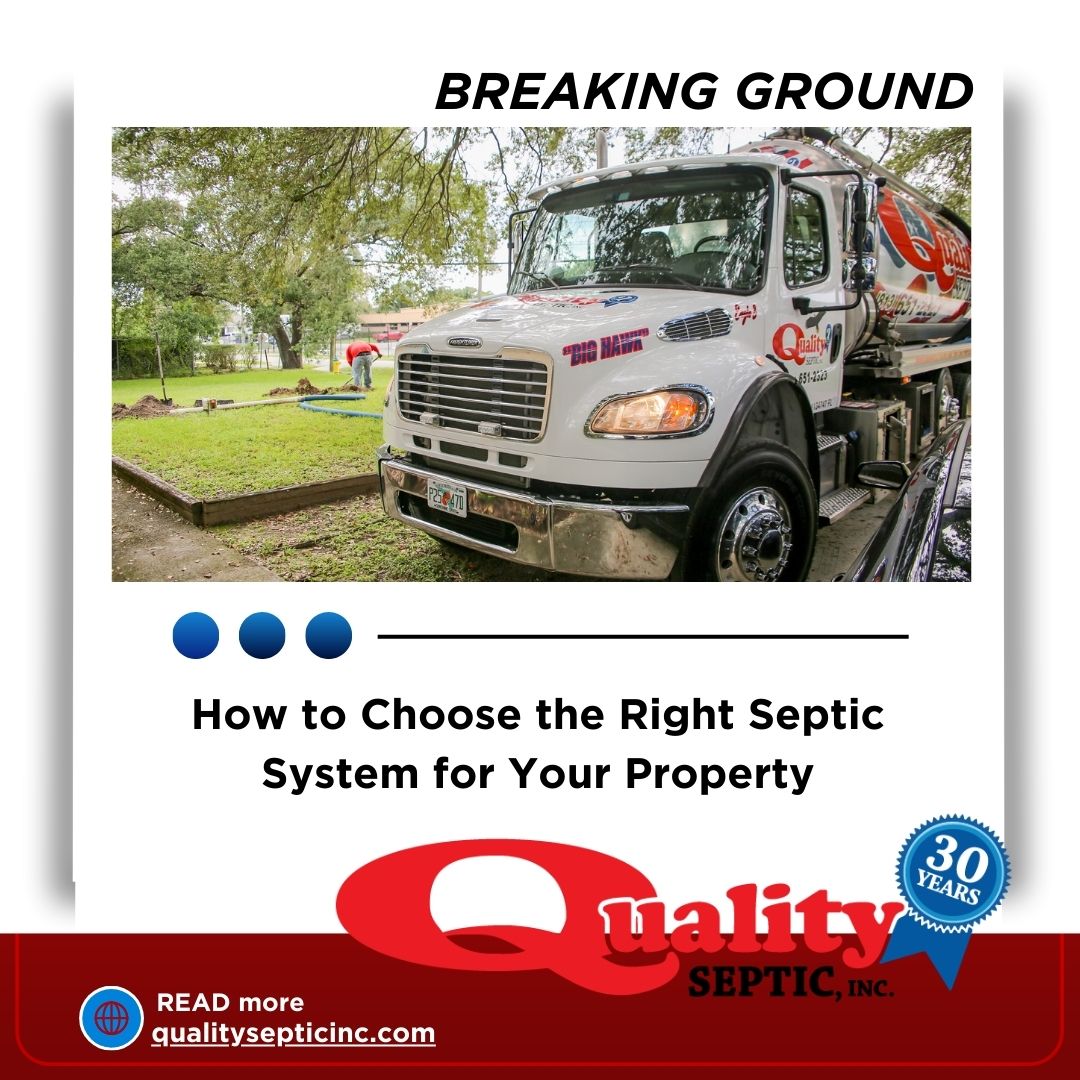Selecting the right septic system for your property is an important decision that can affect your home’s efficiency, the environment, and your property’s overall sanitation. At Quality Septic Inc., we understand the intricacies involved in making this choice and are here to guide you through the process. Whether you’re building a new home or upgrading an existing septic system, here’s what you need to consider to ensure you choose the best septic solution for your needs.

You Have Many Options
When it comes to septic systems, there are several types to choose from. Each has its own advantages and suitability for different conditions. If you are wondering which is right for you, you’ll need to speak with an experienced septic service expert to guide you. In your conversation, you’ll likely cover the following options.
Conventional Septic Systems
Components: Typically includes a septic tank and a drain field.
Best For: Properties with sufficient space and suitable soil conditions.
Pros: Cost-effective and easy to maintain.
Aerobic Treatment Units (ATUs)
Components: Include an aeration chamber, settling chamber, and sometimes a disinfection unit.
Best For: Areas with high water tables, poor soil conditions, or where environmental concerns are paramount.
Pros: Higher treatment level can be used in challenging environments.
Mound Systems
Components: Involves a sand mound where waste is pumped and treated.
Best For: Properties with shallow soil depth, high water table, or bedrock close to the surface.
Pros: Effective in areas where conventional systems are not feasible.
Chamber Systems
Components: Use plastic chambers instead of pipes to create a drain field.
Best For: Properties with poor soil conditions.
Pros: Flexible, easier to install in difficult terrain.
Drip Distribution Systems
Components: Involves a network of small tubes that distribute waste evenly across the soil.
Best For: Properties with uneven terrain or where space is limited.
Pros: Efficient water use, minimal disturbance to the landscape.
Factors to Consider
When choosing a septic system, several factors must be thought about:
Property Size and Layout
The size and shape of your property will influence the type of system that can be installed. Large properties with ample space may benefit from conventional systems, while smaller lots may require more compact solutions like ATUs or chamber systems.
Soil Conditions
An expert will need to conduct a percolation test to determine the soil’s drainage capabilities. This will help identify the most suitable system for your soil type.
Water Table Level
High water tables can affect the functionality of your septic system. Systems like ATUs and mound systems are designed to work efficiently in these conditions.
Local Regulations
Check local health department regulations and requirements. Some areas have specific rules regarding septic system installation and maintenance.
Household Size and Usage
Consider the number of people living in your home and their water usage habits. Larger households may require systems with higher capacities.
Environmental Impact
If you’re environmentally conscious, you may want to choose a system that provides a higher level of treatment, like an ATU, to minimize the impact on local water sources.
Maintenance Requirements
Different systems come with varying maintenance needs:
Conventional Systems: Require regular pumping every 3-5 years and routine inspections.
ATUs: Need more frequent inspections and maintenance due to their mechanical components.
Mound Systems: Require careful monitoring to ensure the mound remains functional.
Chamber Systems: Generally low maintenance but still need regular checks.
Drip Distribution Systems: Need monitoring to ensure the distribution network remains unclogged.
Costs
Initial installation costs and long-term maintenance expenses vary by system:
Conventional Systems: Typically have lower upfront costs.
ATUs: Higher initial investment but may save money in areas where conventional systems aren’t viable.
Mound Systems: Can be expensive due to the materials and labor involved.
Chamber Systems and Drip Distribution Systems: Costs vary depending on site conditions and system complexity.
Choosing the right septic system for your property involves careful consideration of various factors, including soil conditions, property size, water table levels, and local regulations. At Quality Septic Inc., we’re committed to helping you find the ideal solution that meets your needs and ensures efficient, environmentally friendly wastewater management. Contact us today to discuss your options and schedule a site evaluation with our experts.
